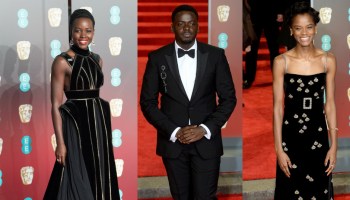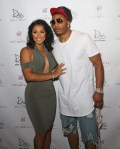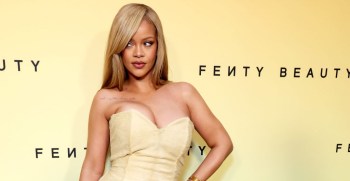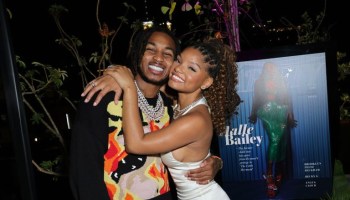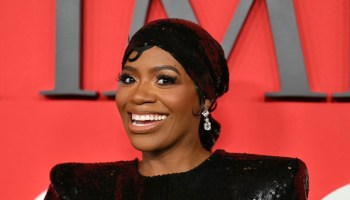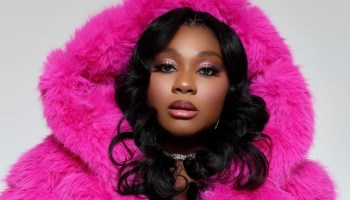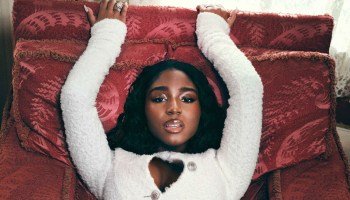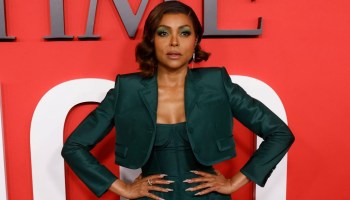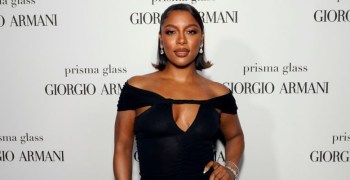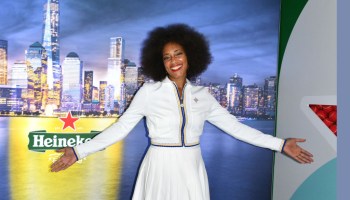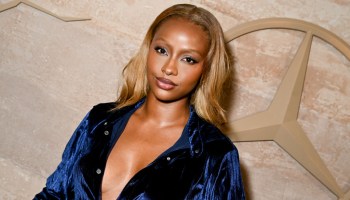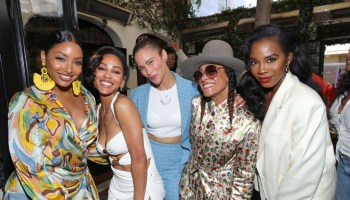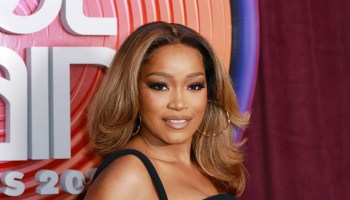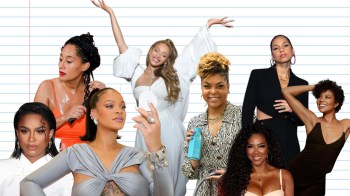Famed writer and Atlantic columnist Ta-Nehisi Coates sat down with stars Chadwick Boseman and Lupita Nyong’o on Tuesday at the Apollo Theatre in Harlem to talk about the juggernaut that is “Black Panther.” Two weeks after the movie’s release, the Marvel flick is something of a phenomenon–a cinematic feat that has successfully turned the movie world on its head, while at the same time shining a light on the humanity of Black men and women around the world.
1. Tradition vs. innovation.
Throughout the movie several themes are embedded within the storyline of a masked, African suited man who has the keys to save the world. It is also a story about re-imagining our understanding of Africa and shutting out the negative imagery centered around the continent. The disconnect not only refers to how White people view the country, but people of the African diaspora as well.
“There’s such a deep misunderstanding about where either of us is coming from,” Nyongo’o stated.
The characters exist between wanting to spread the resources of their vast land, to fiercely protecting it from the outside world. Boseman touched on the topic when he talked about understanding his character T’Challa who was born with a “vibraninum spoon” in his mouth-referring to Wakanda’s most valuable resource.
“It’s power. It’s having privilege and not being aware that people don’t have the privilege,” Boseman said.
2. Black women are the source.
Nyong’o and fellow co-star Danai Gurira are the two female leads of the film. While Nyongo’s character Nakia plays T’Challa’s love interest and a renegade spy, Boseman’s character Okeyo is the female general of the Dora Milaje, a badass army group of women dedicated to protecting the throne. In real life, the two women have known each other for 11 years–Nyongo’o also co-starred with Gurira in the Broadway adaptation of her award-winning play, “Eclipsed.”
“Even in the process, Ryan (Coogler) invited us to participate in the shaping of the story,” Nyong’o said. With me and Danai, we really came together to advocate for the female perspective. We already had a sisterhood, now it’s unbreakable.”
Nyong’o said she deeply enjoyed working on a movie dedicated to showing nuanced female characters. “To tell a story about a women with agency. In Wakanda, beside every good man was a good woman.”
3. The diaspora.
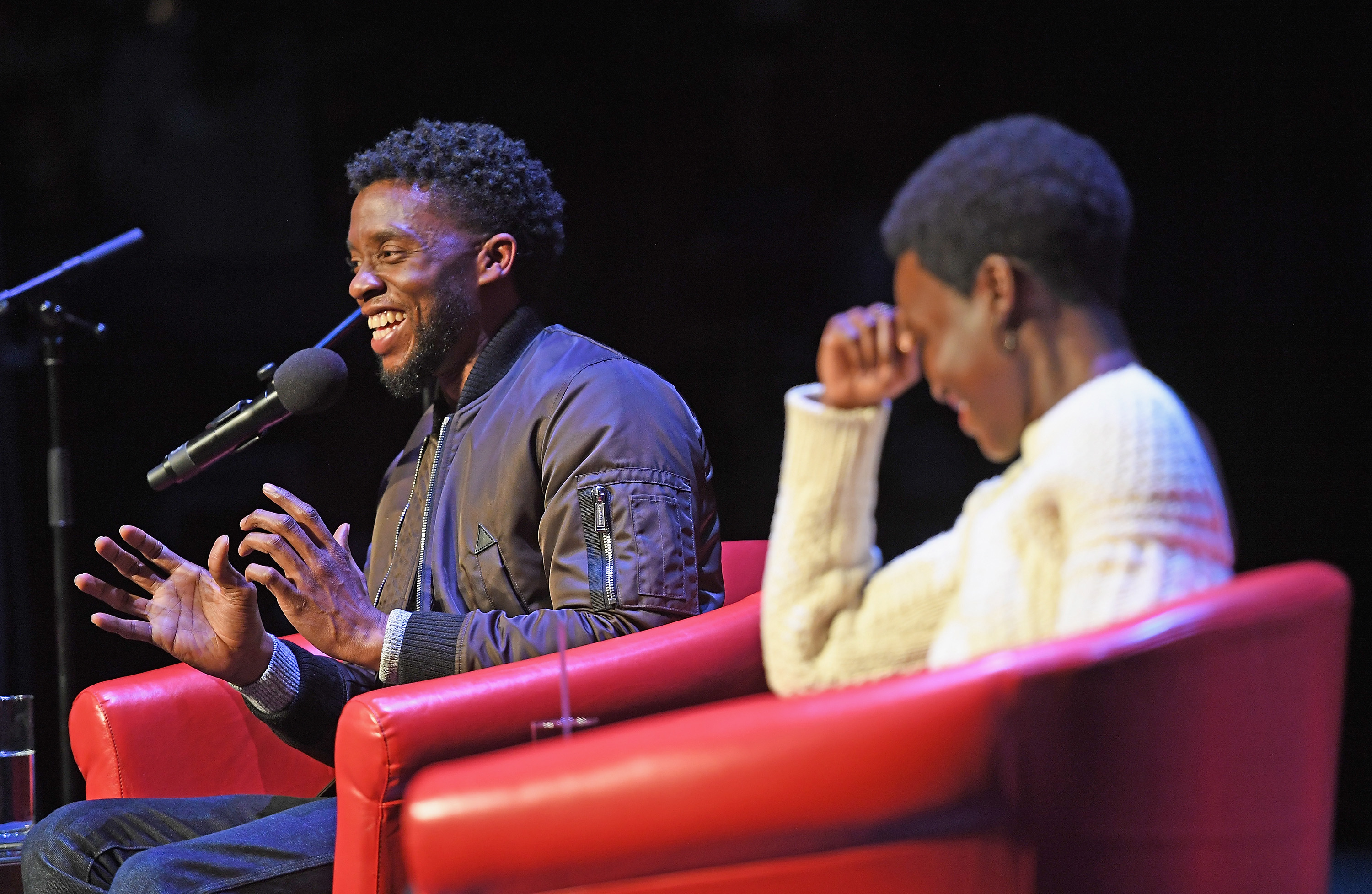
Source: Shahar Azran / Getty
First things first–the movie is unbashedly Black. Everything from the wardrobe choices to the cast, embody the full breadth of the African diaspora. Actors in the movie are people of color from different regions, representing England, the United States, Kenya and different areas of the Caribbean. In the theatre, the pride also seeped into neighborhoods and higher learning institutions. Wakanda is also equally diverse–pulling imagery and tradition from existing African nations and tribes to create what we see on-screen. The movie does its best to encapsulate a true Black experience.
4. We are all Killmonger.
Family and loyalty, the hope of finding oneself in the struggle resonate throughout the movie. Although Michael B. Jordan was not present at the event, his character, Erik Killmonger, was discussed heavily. Killmonger is the “long-lost” cousin of T’Challa whose father, N’Jobu, was killed by his brother T’Chaka, T’Challa’s father. In the movie Killmonger’s sole life purpose is to avenge his father’s death by challenging his cousin’s stake as heir to the throne after the sudden death of T’Challa’s father, T’Chaka. Killmonger also wants to use Wakanda’s vibranium to liberate Black people around the world.
Boseman touched on Killmonger significance to African-Americans, as the character was particularly honed by the movie’s director, Ryan Coogler. T’Challa and Killmonger also come to head on privilege vs. the struggle. Killmonger views his estranged family as disconnected and aloof, unwilling to intervene in freeing those in bondage. T’Challa, stirred by uncovering Killmonger’s true identity, still feels that he is the rightful leader of Wakanda–akin to manifest destiny. It is not until Killmonger’s dramatic death scene that T’Challa comes to a place of compassion for his cousin.
“I don’t know if we could accept T’Challa as our hero, if he didn’t accept Killmonger,” Boseman said referring to the stirring scene.
5. Wakanda represent.
At the end of the discussion, the host invited the audience to participate in a selfie by throwing up the infamous chest “W” behind Boseman, Coates and Nyong’o. The moment signified a unilateral understanding that Wakanda, although fictional, is aspirational. A country proud of its heritage, proud of never being conquered, proud of its secret contribution to the world. All of this embedded within Africa, the motherland of all existence–Wakanda is literally forever.
Watch the whole discussion above.
DON’T MISS:
‘Black Panther’ Star Winston Duke Reacts To Internet Thirst
‘Black Panther’ Profits To Fund Boys & Girls Clubs’ STEM Centers

